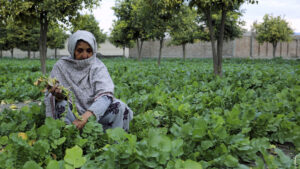Collectively, the European Union and Denmark have contributed 20.2 million dollars in humanitarian aid to Afghanistan to support families in need and address growing food insecurity.
The United Nations World Food Programme (WFP) announced that the European Union has contributed US$17.4 million (€16.5 million) in aid to Afghanistan.
In a report published on its website on Monday, the WFP stated that these funds will be used to support vulnerable families, and to improve nutrition for mothers and young children.
The WFP also added that over the past two years, the European Union has donated a total of $92.5 million to Afghanistan.
“Despite improvements of the food security situation, also due to effective humanitarian assistance, Afghanistan remains a global hunger hotspot with more than a quarter of the population going hungry”, said François Goemans, who oversees EU humanitarian aid operations in Afghanistan. “More than three quarters of all people in Afghanistan cannot afford a nutritious diet that covers their needs and keeps them from falling into malnutrition.”
The United Nations agency emphasized that this winter, 15 million Afghan citizens will face a crisis and emergency-level food insecurity.
The WFP further noted that it has already begun distributing food supplies to remote areas of Afghanistan.
The WFP previously stated that it needs more than $111 million to continue its operations over the next six months.
In addition, the UN Office for the Coordination of Humanitarian Affairs (OCHA) reports a $2.8 million cash contribution from Denmark to Afghanistan’s humanitarian fund.
OCHA emphasized that such contributions enhance their capacity to respond quickly to crises, saying, “Your support strengthens our ability to respond swiftly to emergencies.”
Earlier, OCHA had stated that approximately 22.9 million people in Afghanistan are in need of assistance this year (2025). The agency also highlighted that addressing the needs of these individuals will require a budget of $2.24 billion.






